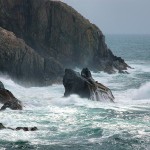This Fragile Earth?
This fragile earth . . .

I have a love-hate relationship with Eucharistic Prayer C but Ascensiontide is the time to use it if ever there is one. Some day I’ll rewrite it to my specifications.
Take, for example, the overwrought phrase, “this fragile earth our island home.” To begin with, this earth, fragile or otherwise, is not “home” for Christians. “Going home to my Lord and be free” as the old spiritual properly puts it.
But “fragile”? I don’t think so. St. Patrick’s Breastplate (Hymn ) sings better of “the stable earth, the deep salt sea around the old eternal rocks.” The sea and the rocks were here when our primeval ancestors first hauled themselves out on dry land and will be here long after we all find homes elsewhere, for better or worse. It’s we who are fragile: “frail creatures of dust and feeble as frail” in the words of another hymn. The earth will adjust to the strain we put on it by eliminating us if necessary and re-balancing the environment for whatever creatures survive, ants most likely.
Then there’s that phrase about “Lord God of our Fathers; God of Abraham, Isaac, and
Jacob” where socially conscious people tend to insert the names of the patriarchs wives, the so-called “matriarchs” – though they didn’t “arch” very much. How does it balance the books to insert the wives? Especially, how does it pay tribute by adding both wives of Jacob, reminding us of our polygamous past? There are, after all, women in the Old Testament who did something worth remembering. I often think of Jael who pounded the tent peg through Sisera’s temple, but that might turn minds away from the Eucharistic moment. I usually settle for Miriam, Deborah, and Esther – women who made a difference.
So why do I turn ti this problematic prayer on Ascension Day. Probably it’s the phrase about “interstellar space” that does it for me,. It gives us a nice, simple three-dimensional way to think of the Ascension.
Isn’t it odd that the most superficially modern of our Eucharistic prayers misses so many boats?
 Christopher L. Webber
Christopher L. Webber